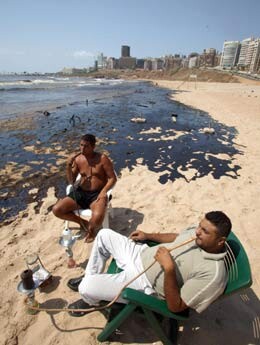IRIN 4 August 2006

Two men smoke water-pipe at Ramlet el-Baida public beach, which has been hit by thousands of tons of heavy fuel oil, after Israeli air strikes hit numerous tanks at the plant in the coastal village El-Jiye, 30km south of Beirut, 4 August 2006. As the tourist beaches of the capital stand empty, as pools of oil slosh up the waves, staining the beach and the rocks. Officials estimate that an additional 15,000 tons of oils are expected to leak into the Mediterranean from a tank that is still burning. (Haitham Mossawi/IRIN)
However, the conflict between Hezbollah and Israel in the south of the country is stopping them from doing so, according to a member of the Lebanese environment ministry, who did not want to be named.
“They cannot mobilise their forces until a ceasefire is called,” said the ministry official. “We are operating in a state of war so normal procedure cannot be followed in this situation … a lot of countries are on standby trying to get the aid to us,” she said.
Although emergency services have succeeded in putting out a fire, which threatened a tank containing 15,000 tonnes of oil, there has been a further spill of as much as 2,000 tonnes.
The oil spill into the Mediterranean Sea has affected about a third of the country’s 200km coastline and has reached as far north as Syria.
Beaches across Lebanon have been covered with a thick layer of sludge, a further blow to coastal communities already badly hit by the exodus of tourists and locals when the conflict first began.
Local ecologists say the oil spill also threatens fish spawning grounds and sea turtles, including the endangered green turtle.
At the Sporting Beach club in west Beirut a thick layer of oil covers the concrete sundeck and the club’s management says business has almost disappeared. “Even if there was no oil in the sea, there is no season because no one is here. It’s war,” said Toni Morrino, manager of the club.
Summer is the peak time for the Lebanese fishing industry and as well as being hit by the oil spill, fishermen have been prevented from taking their boats out to sea by the Israeli blockade.
Wafic al-Jizi, the head of the fishermen’s union in Beirut, said many in the industry were suffering. “There is no money now. The Israeli navy and this oil have stopped everything,” he said, looking at the empty fishing harbour in the Rawche area.
“If the government doesn’t do anything then we don’t know what will happen,” he said.
So far the Lebanese government has received 800 booms, floating barriers used for oil spill recovery, and 40 barrels of detergent. This is only a small part of the equipment needed for a clean-up operation that will cost more than US $130 million and take a year to complete.
The conflict between Israel and Lebanon-based Hizbollah flared after militants captured two Israeli soldiers in a July 12 raid.
Paul Mifsud, the Coordinator of the United Nations Environmental Programme - Mediterranean Action Plan said that immediate action was vital but that this called for a halt to hostilities.
“In addition to the humanitarian circumstances, an environmental catastrophe is threatening the Mediterranean region”, he said. “Hostilities must cease to guarantee immediate safe access to the affected area”.
Syria has also requested UNEP to send help to control the spilled oil on its shoreline and territorial waters and to assess environmental degradation costs.
Related Links
This item comes to you via IRIN, a UN humanitarian news and information service, but may not necessarily reflect the views of the United Nations or its agencies. All IRIN material may be reposted or reprinted free-of-charge; refer to the copyright page for conditions of use. IRIN is a project of the UN Office for the Coordination of Humanitarian Affairs.